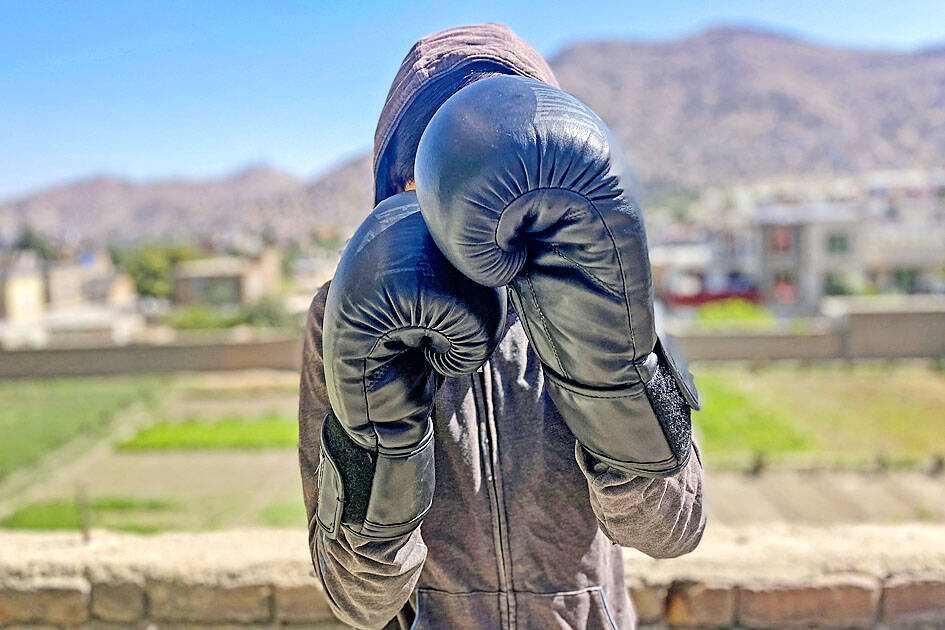Most mornings after praying, 25-year-old Sanah joins several women from her neighborhood in the Afghan capital, Kabul, for a walk along the main road before it fills with traffic, never jogging or getting too near to the many Taliban checkpoints.
They exercise secretively, and not for competition, but for a modicum of health and peace of mind in a country where the Taliban government have stopped women from playing sports.
“We cannot go near the Taliban checkpoint because they say: ‘Why are you outside the house so early? Where are you going? Why do you need to exercise, you don’t have to, so don’t’,” said Sanah, whose name has been changed — along with all the women interviewed — for fear of reprisal.

Photo: AFP
The Taliban authorities have implemented an austere interpretation of Islamic law, with women bearing the brunt of restrictions that the UN has labeled “gender apartheid.”
In November 2022, the Afghan Ministry for the Propagation of Virtue and the Prevention of Vice announced that women were barred from parks and gyms on the grounds they were not adhering to a dress code that orders them to cover up.
Gyms had previously offered time slots for women, and while some informal women-only fitness clubs still exist, they are rare and low-profile.
Sanah and one of her companions, Latifah, who is middle-aged, used to walk in the large, tree-lined parks in the city.
The last time Latifah went to the park near her house, not long after they were permanently closed to women, she said she was forcibly removed, crying as she recalled the incident.
“The doctor told me to exercise more because I have high cholesterol and fatty liver, but the Taliban don’t let us exercise or go to the gym or walk [freely] outside,” she said.
Sanah yearns to become a yoga teacher and guides the group through some gentle aerobic exercises and meditation after their walk.
Pressing her thumb and forefinger together on her knees in the yellow dawn light, away from prying eyes on a protected balcony, Sanah says softly, “Take a deep breath.”
Forced out of their gym, Rayan and a few fellow women boxers instead visit a friend’s home and use what little equipment they have to practice in a society that was already hostile to women in sport, but has now turned draconian.
“We train less, but we never stopped,” said the 19-year-old Rayan, watching a video on her cellphone in which her fists fly in jabs and hooks — a bittersweet reminder of the avid boxer she once was.
Pulling her headscarf off in a private garden in the Kabul heat, fellow former competitive boxer Bahar said the situation had left her and other Afghan women stressed, exhausted and low.
“But when we box, it pushes all that away for a moment. Even if we only train for a few minutes it makes a big difference,” the 20-year-old said, the henna from her recent wedding still staining her hands.
Her husband does not know she still boxes. Many women athletes fled Afghanistan after the Taliban takeover.
Some still compete on the international stage, including at the recent Paris Olympics, but they come from outside the country and under the flag of the ousted Islamic Republic of Afghanistan.
The Taliban authorities are not officially recognized by any state.
“In Afghanistan, girls’ sports have been stopped. When girls’ sport isn’t practiced, how can they join the national team?” said Atal Mashwani, spokesman for the Afghan General Directorate of Physical Education and Sport.
Banafsha, a black belt in the Chinese martial art of wushu, voiced the mixed feelings echoed by others about Afghan women’s Olympic participation.
The Afghan team in Paris had three men and three women, while Afghan women also competed in the Refugee Team.
“It made me happy that women haven’t surrendered yet, they are committed to their goals,” she said. “But I was also sad. Why can’t they go to the Olympics from within their own country?”
The former national competitor burned her uniform when the Taliban took power. These days she can barely leave the house and struggles to motivate herself to practice, feeling “hopeless and heartbroken.”
Hasina Hussain Zada, who works for Free to Run, an organization focused on women’s empowerment through sport, said that while there is a range of online exercise videos and classes, they cannot replace in-person training, being in a team or exercising outdoors.
“We tell our participants to think about it as if it were COVID time,” said the 28-year-old, who fled to Canada after the Taliban takeover.
She has worked since 2018 with the nonprofit, which is still supporting women in Afghanistan in indoor exercise — albeit “cautiously and secretly.”
“You don’t need to think about the Taliban, the rules ... just think about it as if it were COVID time when everyone was doing their exercises at home,” she said. “We’re trying to change their mindsets; we’re trying to give them hope.”

Shohei Ohtani and Clayton Kershaw on Friday joined their Los Angeles Dodgers teammates in sticking their fists out to show off their glittering World Series rings at a ceremony. “There’s just a lot of excitement, probably more than I can ever recall with the Dodger fan base and our players,” manager Dave Roberts said before Los Angeles rallied to beat the Detroit Tigers 8-5 in 10 innings. “What a way to cap off the first two days of celebrations,” Roberts said afterward. “By far the best opening week I’ve ever experienced. I just couldn’t have scripted it any better.” A choir in the

The famously raucous Hong Kong Sevens are to start today in a big test for a shiny new stadium at the heart of a major US$3.85 billion sports park in the territory. Officials are keeping their fingers crossed that the premier event in Hong Kong’s sporting and social calendar goes off without a hitch at the 50,000-seat Kai Tak Stadium. They hope to entice major European soccer teams to visit in the next few months, with reports in December last year saying that Liverpool were in talks about a pre-season tour. Coldplay are to perform there next month, all part of Hong Kong’s

Shohei Ohtani, Teoscar Hernandez and Tommy Edman on Thursday smashed home runs to give the reigning World Series champions the Los Angeles Dodgers a 5-4 victory over Detroit on the MLB’s opening day in the US. The Dodgers, who won two season-opening games in Tokyo last week, raised their championship banner on a day when 28 clubs launched the season in the US. Dodgers manager Dave Roberts shuffled his batting lineup with all four leadoff hitters finally healthy as Ohtani was followed by Mookie Betts, then Hernandez and Freddie Freeman in the cleanup spot, switching places with Hernandez. “There’s a Teoscar tax to

Matvei Michkov did not score on Monday, but the Philadelphia rookie had a hand in both goals as hosts the Flyers earned a 2-1 victory over the Nashville Predators. Ryan Poehling and Jamie Drysdale got the goals for the Flyers (31-36-9, 71 points), who won their third straight. Michkov and Travis Konecny assisted on both. Ivan Fedotov stopped 28 shots to earn his first win since March 1, ending a personal six-game losing streak. Zachary L’Heureux got the lone goal for Nashville. Michael McCarron and Brady Skjei got the assists for the Predators (27-39-8, 62 points), who have just four goals in their